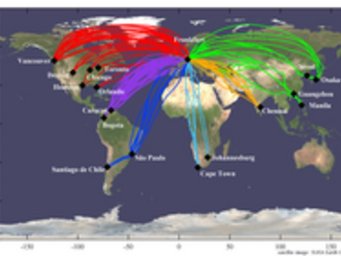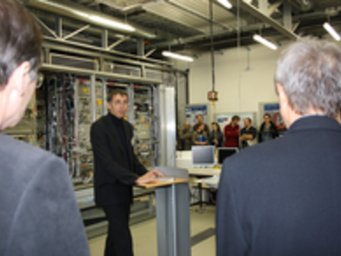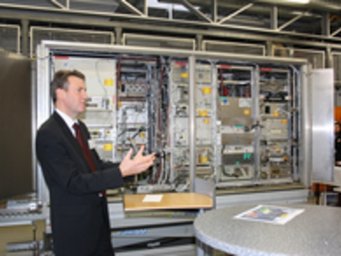Frequent Flyer Program for Atmospheric Researchers
Flying Observatory Travels Two Million Kilometers – Fraport AG Supports Research Project with €600,000
Mainz/FRA, São Paolo, Vancouver or Osaka: These are just some of the dream destinations that the mobile laboratory of the Max Planck Institute (MPI) for Chemistry, based in Mainz near Frankfurt, has already flown to. Since 2005, this flying observatory – known as CARIBIC (Civil Aircraft for the Regular Investigation of the Atmosphere Based on an Instrument Container) – has traveled more than two million kilometers during monthly long-distance flights via Frankfurt Airport (FRA) on board a Lufthansa passenger aircraft. A true frequent flyer, the CARIBIC measuring container continuously collects air samples during flight and utilizes highly sensitive instruments to record the concentration of more than 50 different substances: including aerosols, ozone, carbon monoxide and greenhouse gases such as nitrous oxide and methane. Data collected by CARIBIC are invaluable for the atmospheric and climate research being done by scientists at the Max Planck Institute for Chemistry in Mainz as well as other institutes throughout Germany and Europe.
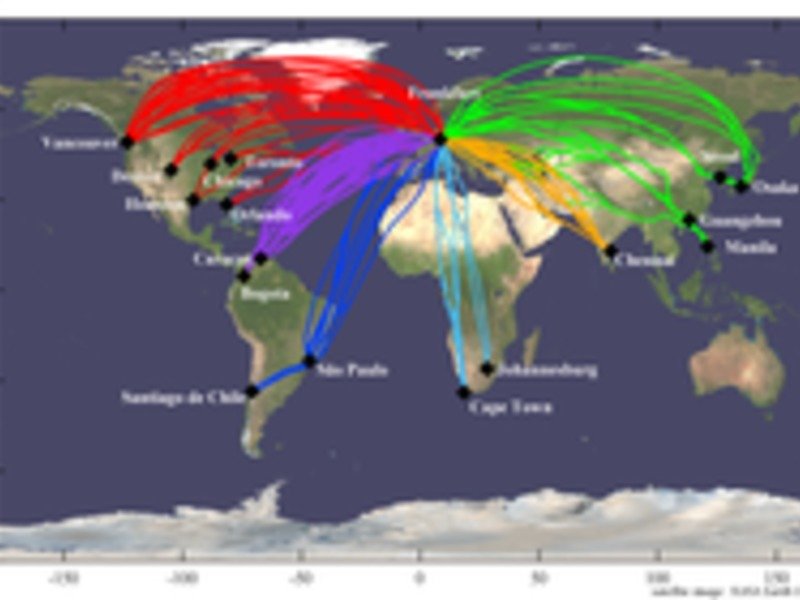
“The Earth’s atmosphere is very complex and constantly changing. To understand the chemical processes of our atmosphere, it is important to observe many parameters over years,” explained Dr. Carl Brenninkmeijer at the opening of the 10th CARIBIC Workshop, where 35 scientists are meeting at the Max Planck Institute on the campus of Johannes Gutenberg University in Mainz from November 28-30, 2012. “The more insight we gain into these processes, the more reliable our statements on climate change will be,” adds Brenninkmeijer, who has been working on the development and operation of the flying observatory since 1997. Twelve additional European scientific institutions are collaborating on the CARIBIC project, as well as Lufthansa. Fraport AG, the Frankfurt Airport company, is a major financial supporter of this unique project that is expanding our understanding of the planet’s atmosphere.
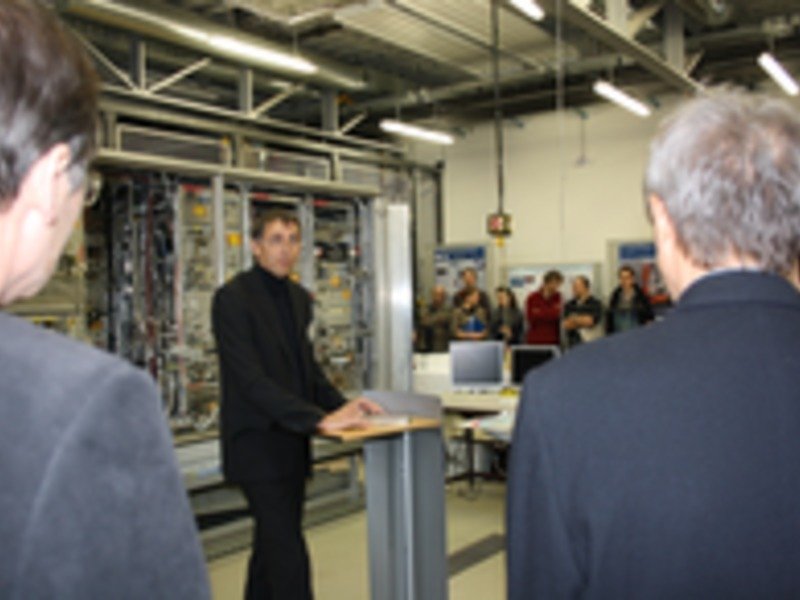
Dr. Wolfgang Scholze, Fraport AG’s head of environmental management, said: “Climate change and human impact on the atmosphere are issues that concern all of us. At the same time, this is an extremely complex phenomenon that still requires a lot of research. As an airport operator, we take this responsibility very seriously. Thus, since 2009 we have invested about €600,000 from the Fraport AG Environmental Fund to support the Max Planck Institute’s CARIBIC flying laboratory. We are excited to learn about the research findings and conclusions, especially results – keyword “ash cloud” – that could also be applicable to our industry.”
Dr Andreas Waibel, Lufthansa AG’s environmental concepts manager, commented on Lufthansa’s participation in the CARIBIC project: “We have been involved in climate research for nearly two decades and are thus providing the data base for researchers to improve and validate their climate models.”
The CARIBIC container (a modified air-cargo container) has just returned from its 80th journey. This time the flying laboratory is arriving back in Frankfurt from Kuala Lumpur, a flight route of particular interest to researchers. The flight over the tropics provides data from the so-called “laundry of the atmosphere”. The densely populated urban areas in Asia not only emit various trace gases into the atmosphere. These gases also degrade rather quickly and are washed away by rain, because the high temperatures and intense solar radiation results in strong convection in the atmosphere, which drives chemical degradation.
Recently, the CARIBIC project delivered some surprising climate data. Researchers detected that during the monsoon season far greater quantities of the methane greenhouse gas develop from South Asia’s soils than previously thought. Agriculture in India and neighboring countries is not the only cause of this. Just like in the rice fields, gas-producing bacteria also grow in many swamps, landfills and sewers during heavy rainfalls.
When the CARIBIC laboratory flies close to volcanoes, the focus is on sulfur dioxide. Volcanoes are a natural source of sulfur dioxide gas and release high quantities of it, even when the volcano is inactive. Currently, the measuring container has classified the gas clouds of five volcanoes, including Eyjafjallajökull, the Icelandic volcano that brought European air traffic to a standstill in the spring of 2010. At that time, Lufthansa launched three special flights from Frankfurt for research purposes – but there were not any passengers on board, only the CARIBIC container.
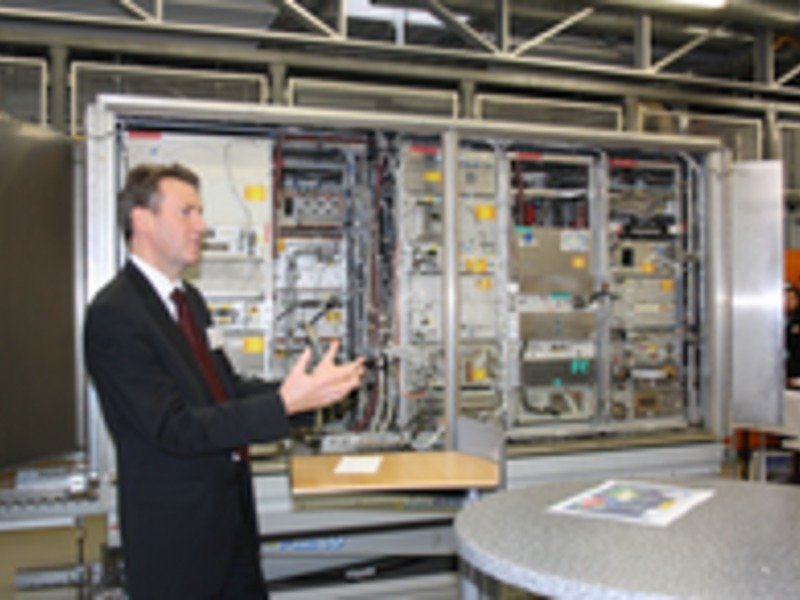
Hintergrund:
The CARIBIC project (www.caribic.de) uses a 1.5 ton instrument container to perform measurements in the atmosphere worldwide. Six German partners are involved in CARIBIC: the Max Planck Institute for Chemistry in Mainz, the Karlsruhe Institute for Technology, the Leibniz Institute for Tropospheric Research in Leipzig, the Department of Atmospheric Physics at the German Aerospace Center, the University of Heidelberg’s Institute for Environmental Physics, and the Institute for Environmental Physics at the Helmholtz Center in Geesthach. Furthermore, six international partners are involved in this German-developed project, which is coordinated by the Max Planck Institute for Chemistry in Mainz. Every month, the flying laboratory travels in the cargo hold of Lufthansa’s Airbus A-340-600 plane named after the city of “Leverkusen”. A specially designed inlet system on the belly of the aircraft sucks in aerosol and particle samples and transmits weather data to the instruments inside the container. The equipment measures over fifty climate-relevant trace gases as well as water vapor and aerosol particles in the atmosphere. The detailed data facilitate the identification of contamination sources and provide insight on how the atmosphere cleans itself. In the long-term, this provides a more accurate representation of the atmosphere and its processes at comparatively low costs. The project is supported by Lufthansa, by Fraport AG (the Frankfurt Airport company since 2009) and others.
